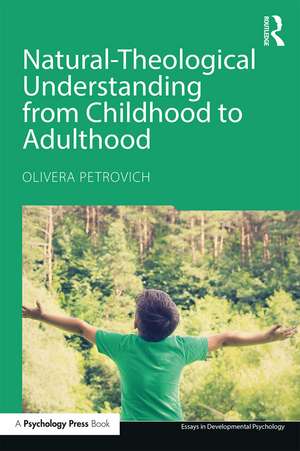Natural-Theological Understanding from Childhood to Adulthood: Essays in Developmental Psychology
Autor Olivera Petrovichen Limba Engleză Paperback – 18 sep 2018
Whilst children’s theoretical reasoning in biology, physics and psychology has received considerable attention in recent developmental research, the same could not be said about their religious or theological understanding. Olivera Petrovich explores children’s religious concepts, from a natural-theological perspective. Using supporting evidence from a series of studies with children and adults living in as diverse cultures as the UK and Japan, Petrovich explains how young children begin to construct their everyday scientific and metaphysical theories by relying on their own already advanced causal understanding. The unique contribution that this volume makes to the developmental psychology of religion is its contention that religion or theology constitutes one of the core domains of human cognition rather than being a by-product of other core domains and specific cultural inputs.
Natural-Theological Understanding from Childhood to Adulthood is essential reading for students and researchers in cognitive-developmental psychology, religious studies, education and cognitive anthropology.
| Toate formatele și edițiile | Preț | Express |
|---|---|---|
| Paperback (1) | 364.86 lei 6-8 săpt. | |
| Taylor & Francis – 18 sep 2018 | 364.86 lei 6-8 săpt. | |
| Hardback (1) | 1001.84 lei 6-8 săpt. | |
| Taylor & Francis – 13 sep 2018 | 1001.84 lei 6-8 săpt. |
Din seria Essays in Developmental Psychology
-
 Preț: 295.14 lei
Preț: 295.14 lei -
 Preț: 339.90 lei
Preț: 339.90 lei - 13%
 Preț: 296.31 lei
Preț: 296.31 lei - 23%
 Preț: 470.73 lei
Preț: 470.73 lei -
 Preț: 460.69 lei
Preț: 460.69 lei -
 Preț: 461.66 lei
Preț: 461.66 lei - 18%
 Preț: 1003.30 lei
Preț: 1003.30 lei -
 Preț: 491.01 lei
Preț: 491.01 lei - 48%
 Preț: 514.10 lei
Preț: 514.10 lei -
 Preț: 412.37 lei
Preț: 412.37 lei -
 Preț: 438.86 lei
Preț: 438.86 lei - 13%
 Preț: 350.33 lei
Preț: 350.33 lei -
 Preț: 407.57 lei
Preț: 407.57 lei -
 Preț: 470.32 lei
Preț: 470.32 lei -
 Preț: 465.49 lei
Preț: 465.49 lei -
 Preț: 388.10 lei
Preț: 388.10 lei - 34%
 Preț: 764.20 lei
Preț: 764.20 lei -
 Preț: 367.83 lei
Preț: 367.83 lei - 26%
 Preț: 990.09 lei
Preț: 990.09 lei -
 Preț: 447.51 lei
Preț: 447.51 lei - 15%
 Preț: 420.18 lei
Preț: 420.18 lei - 18%
 Preț: 1004.86 lei
Preț: 1004.86 lei - 26%
 Preț: 765.43 lei
Preț: 765.43 lei
Preț: 364.86 lei
Nou
Puncte Express: 547
Preț estimativ în valută:
69.82€ • 72.48$ • 58.22£
69.82€ • 72.48$ • 58.22£
Carte tipărită la comandă
Livrare economică 24 martie-07 aprilie
Preluare comenzi: 021 569.72.76
Specificații
ISBN-13: 9781138939479
ISBN-10: 1138939471
Pagini: 182
Ilustrații: 35
Dimensiuni: 156 x 234 x 16 mm
Greutate: 0.34 kg
Ediția:1
Editura: Taylor & Francis
Colecția Routledge
Seria Essays in Developmental Psychology
Locul publicării:Oxford, United Kingdom
ISBN-10: 1138939471
Pagini: 182
Ilustrații: 35
Dimensiuni: 156 x 234 x 16 mm
Greutate: 0.34 kg
Ediția:1
Editura: Taylor & Francis
Colecția Routledge
Seria Essays in Developmental Psychology
Locul publicării:Oxford, United Kingdom
Cuprins
Preface
Acknowledgements
Chapter One
Introduction
Chapter Two
Causal understanding: Physical and metaphysical
Chapter Three
Children’s theories: Scientific and non-scientific
Chapter Four
Early ontological knowledge: The world and its contents
Chapter Five
In the beginning: Cosmological reasoning in children and adults
Chapter Six
The natural-theological concept of God: A unique causal agent
Chapter Seven
Theology as a core cognitive domain
Chapter Eight
Innateness of religion within the limits of science alone
Chapter Nine
Conclusions, exclusions and some implications
References
Appendix
Author Index
Subject Index
Acknowledgements
Chapter One
Introduction
Chapter Two
Causal understanding: Physical and metaphysical
Chapter Three
Children’s theories: Scientific and non-scientific
Chapter Four
Early ontological knowledge: The world and its contents
Chapter Five
In the beginning: Cosmological reasoning in children and adults
Chapter Six
The natural-theological concept of God: A unique causal agent
Chapter Seven
Theology as a core cognitive domain
Chapter Eight
Innateness of religion within the limits of science alone
Chapter Nine
Conclusions, exclusions and some implications
References
Appendix
Author Index
Subject Index
Notă biografică
Olivera Petrovich is Research Fellow at the University of Oxford in the Department of Experimental Psychology. Her research deals with the origin and development of natural religious understanding across different cultures.
Recenzii
A common objection to teaching about religious faith by parents and schools is that this implants ideas that children would otherwise lack. In this fascinating book, Olivera Petrovich explores the validity of this objection. Drawing on data with children and adults from different religious cultures and traditions, Petrovich shows that children’s questions about the physical world lead them to postulate causal agents which transcend the empirical domain. In other words, they behave much as natural theologians have always done. Petrovich’s work has major implications for how we should teach about theology in schools and elsewhere. Professor Michael J Reiss, UCL Institute of Education
Descriere
This volume sheds new light on children’s acquisition of the concept of God, repositioning the development of religious understanding as one of the core domains of human cognition. Petrovich’s argument- that children are intuitive or everyday natural theologians – is underpinned by new evidence from several studies involving children and adults from very different cultures and religions. In discussing the implications of an early natural-theological theory for cognitive development, the book also considers the practical relevance for children’s education, especially in science and in religion. This book will be invaluable for students in developmental psychology, education and theology.
